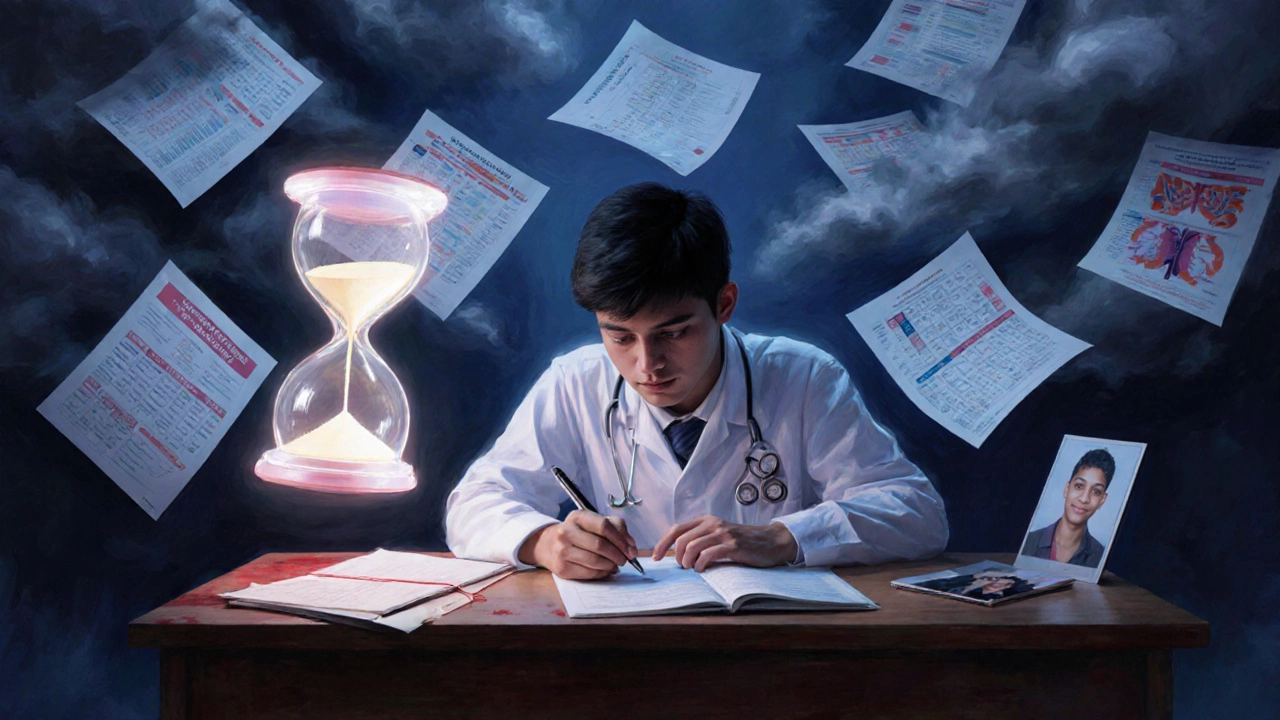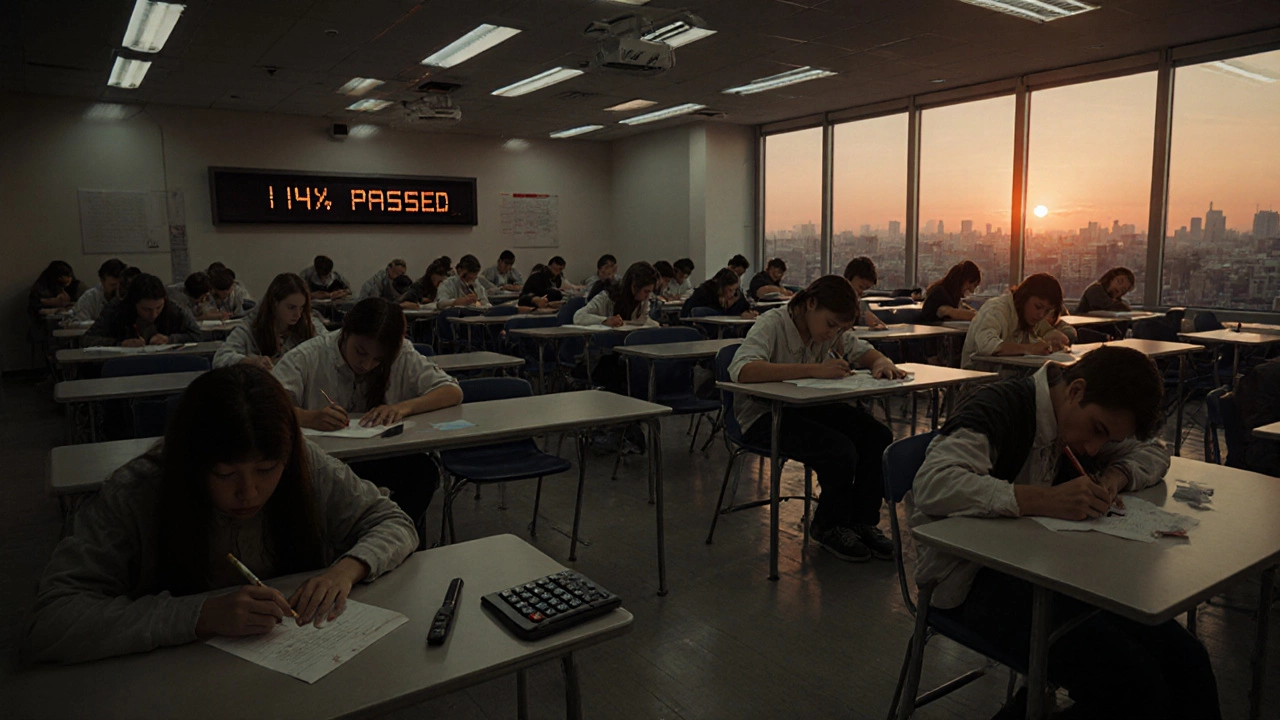Grit Assessment Tool: Which Degree Matches Your Mindset?
Your Path to Success
This tool helps you assess if your personality and resilience match the demands of India's toughest degrees. Based on research from the article, select traits that describe you:
When you’re a CBSE student in Class 12, everyone asks: What are you studying after 12th? But no one asks: Which degree will break you? The truth? Some degrees don’t just test your memory-they test your sleep, your sanity, and your will to keep going.
Engineering: The IIT JEE Grind
If you’ve ever sat through a 3-hour IIT JEE mock test at 6 a.m., you know what we’re talking about. Engineering, especially from top IITs, isn’t just hard-it’s relentless. The syllabus covers advanced calculus, thermodynamics, organic chemistry, and data structures-all in one semester. And it’s not just about passing. You need to rank in the top 0.1% to even get in.
CBSE students who choose engineering often start preparing in Class 9. By Class 11, they’re solving 50+ problems a day. The dropout rate in the first year of IITs? Nearly 30%. Not because they’re dumb. Because the pace doesn’t stop. One student from Delhi told me: “I studied 14 hours a day for two years. When I got into IIT Bombay, I cried-not from joy, but from exhaustion.”
Medicine: NEET and the 10,000-Hour Rule
NEET is the gatekeeper. And if you think biology is just memorizing the human body, you haven’t seen the syllabus. Human Physiology, Genetics, Microbiology, Pharmacology, Biochemistry-all crammed into one exam. And it’s not enough to know it. You need to recall it in under a minute per question.
Medical aspirants often spend 10-12 hours a day studying. Many skip birthdays, holidays, and even family events. The pass rate? Around 15% for top government colleges. And that’s just to get in. Once you’re in, MBBS is a 5.5-year marathon with 12-hour hospital shifts by the third year. You’re memorizing 200+ drugs, their side effects, and interactions. One doctor from Mumbai said: “I passed NEET, but I didn’t sleep properly for three years.”
Chartered Accountancy: The Silent Beast
Most people think CA is just accounting. It’s not. It’s law, auditing, taxation, cost management, corporate law, and ethics-all tested in six papers, spread over four years. The pass rate? Around 15-18% per level. And you can’t retake just one paper. Fail one, and you redo the whole group.
CBSE students who pick CA often start after Class 12. They juggle college lectures with CA classes, internships, and self-study. Many work part-time to afford coaching fees. The final level is infamous. In 2024, only 1,870 out of 14,000 candidates cleared it. That’s less than 14%. And the exam? Three days. Eight papers. 28 hours of writing. No calculator allowed for two papers.
Law: The Hidden Marathon
Five-year BA LLB programs are often seen as “easy” because they don’t require an entrance exam like JEE or NEET. But that’s a myth. Law isn’t about memorizing statutes. It’s about logic, case analysis, legal writing, and public speaking. You need to read 50+ judgments a week. You learn to argue both sides of a case-sometimes within the same day.
At top NLU campuses like NLSIU Bangalore, students average 8-10 hours of reading daily. Moot courts, internships at high courts, and research papers pile up. One student from Jaipur said: “I thought law was about arguing. Turns out, it’s about writing 10,000-word briefs at 3 a.m. while your friends are partying.”

Architecture: Design, Math, and Sleep Deprivation
Architecture requires you to be an artist, an engineer, and a mathematician-all at once. The NATA and JEE Paper 2 exams test spatial ability, drawing, and math. Once admitted, you’re drawing 20+ sketches a week. You build models at 2 a.m. You’re graded on creativity, precision, and presentation.
CBSE students with a science background often struggle with the design part. Those with an arts background struggle with structural calculations. The course lasts five years. Many drop out because they can’t handle the pressure of constant evaluation. One student from Pune said: “I failed my first studio review. My professor said my design was ‘emotionally flat.’ I cried for three days. Then I redesigned it. Again.”
Why CBSE Makes It Harder
CBSE’s syllabus is structured for national exams. That means you’re trained early to memorize, calculate, and perform under pressure. But the toughest degrees don’t reward memorization. They reward endurance, adaptability, and emotional resilience.
CBSE students are used to scoring 95% in exams. But in CA, NEET, or IIT JEE, 70% is considered excellent. That shift-from perfectionism to survival-breaks many. The system trains you to chase marks. But the toughest degrees ask you to chase understanding, even when you’re exhausted.
It’s Not About the Degree. It’s About the Mindset.
There’s no official ranking of “toughest degree.” But if you ask students who’ve lived through them, three names come up again and again: IIT engineering, NEET medicine, and Chartered Accountancy.
Here’s what they all share:
- High competition: 100+ applicants for every seat
- Long preparation: 2-4 years of daily study before even starting
- Low pass rates: Under 20% at key stages
- High financial cost: Coaching, books, mock tests-often over ₹5 lakh
- Emotional toll: Anxiety, isolation, burnout
Choosing one of these paths isn’t about ambition. It’s about grit. You don’t need to be the smartest. You need to be the one who shows up when no one’s watching.

What If You’re Not Cut Out for This?
There’s no shame in choosing something harder but less brutal. B.Sc. in Data Science, B.Tech in AI, or even B.Com with CFA prep can lead to great careers. The Indian job market doesn’t just need IIT engineers and doctors. It needs analysts, designers, coders, and entrepreneurs.
Many students pick CA or IIT because their parents expect it. Others do it because they think it’s the only path to respect. But respect doesn’t come from the degree. It comes from what you build after it.
Final Thought: The Real Test Starts After
Passing NEET doesn’t make you a doctor. Clearing CA Final doesn’t make you a chartered accountant. Getting into IIT doesn’t make you an engineer.
The real test is what happens after the exams. The 60-hour workweeks. The on-call nights. The audits at midnight. The projects that fail. The rejections. The self-doubt.
If you’re still thinking about which degree is toughest-ask yourself this: Are you ready to keep going, even when no one cheers? That’s the real question.
Is IIT JEE tougher than NEET?
It depends on your strengths. IIT JEE tests problem-solving in math and physics under time pressure. NEET tests memory and speed in biology and chemistry. Both have similar competition levels, but IIT JEE requires deeper conceptual understanding, while NEET demands near-perfect recall of 1,500+ biological facts. Neither is objectively harder-just different.
Can you clear CA after Class 12 without coaching?
Yes, but it’s rare. Around 5% of CA aspirants clear all levels without coaching. They usually have strong math and analytical skills, access to quality study material, and discipline to follow a strict schedule. Most successful self-learners spend 8-10 hours daily, use ICAI study modules, and take mock tests religiously. Coaching helps with structure and feedback, but it’s not mandatory.
Is MBBS harder than engineering?
MBBS is harder in terms of volume and emotional stress. Engineering has complex theory, but MBBS adds clinical exposure, patient interaction, and 24/7 responsibility. In engineering, you fail a project. In medicine, you could miss a diagnosis. The stakes are higher. Both are tough, but MBBS demands emotional stamina most engineering students never face.
Which degree has the highest dropout rate in India?
Engineering has the highest dropout rate-nearly 35% in the first year, according to AICTE data. Many students enter because of parental pressure or lack of better options. Once they hit advanced calculus or programming, they realize they don’t enjoy it. CA and architecture also have high dropouts, but for different reasons: financial strain and creative burnout, respectively.
Are there any easier alternatives to IIT, NEET, and CA?
Yes. B.Sc. in Computer Science, B.Tech in Information Technology, B.Com with ACCA or CFA, or even B.Des in Design can lead to high-paying careers with less pressure. These programs still require hard work, but they don’t have the same 100:1 competition ratios. The key is matching your interest with your path-not your parents’ expectations.
What Comes Next?
If you’re in Class 11 or 12 right now, don’t just pick a degree because it’s popular. Ask: What do I enjoy doing for hours without getting bored? What kind of work makes me lose track of time? That’s your real compass.
The toughest degree in India isn’t the one with the hardest syllabus. It’s the one you choose for the wrong reasons.

